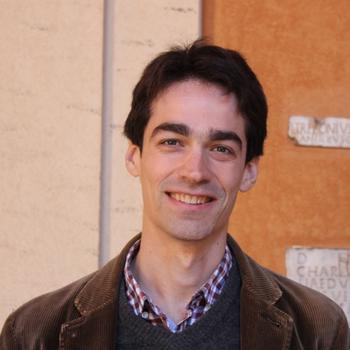Dr. Alexandre M. Roberts (2020/21, 2023/2024)

Seminar for Semitic and Arabic Studies
Arabic Studies
Fellow Alexander von Humboldt Stiftung
Chemistry and Its Consequences in Byzantium and the Islamic World (2023/24)
Room -1.1073.08
14195 Berlin
Alexandre Roberts (PhD in History, Berkeley 2015; MA in History, Berkeley 2011; AB in Physics, Princeton 2008) is Associate Professor of Classics and History at the University of Southern California (in Los Angeles). His first book, Reason and Revelation in Byzantine Antioch (University of California Press, 2020), is on the eleventh-century Arabic-speaking, Byzantine-Christian scholar ʿAbdallāh ibn al-Faḍl of Antioch as a window onto the engagement with ancient Greek, Byzantine, and Islamicate thought that took place in and around Antioch-on-the-Orontes during the pivotal century of Byzantine rule over Northern Syria.
At the Freie Universität Berlin, his project “Matter Redeemed” was supported by a Humboldt Research Fellowship (2020–2021) and investigated how scholars in Byzantium and Islamic world understood matter and its transformation. So far two publications have come out of that work, “Byzantine Engagement with Islamicate Alchemy” (in 2022 in the journal Isis) and “Thinking about Chemistry in Byzantium and the Islamic World” (in 2023 in The Journal of the History of Ideas).
In 2023–2024 he is again a Visiting Scholar at the Freie Universität Berlin, where he is carrying this work further in a monograph in progress entitled Chemistry and Its Consequences in Byzantium and the Islamic World.
Research projects
Chemistry and Its Consequences in Byzantium and the Islamic World (2023/24)
The research project is a monograph in progress entitled Chemistry and Its Consequences in Byzantium and the Islamic World, which traces how medieval intellectuals writing in Greek and Arabic in various textual traditions, from Bukhara to Baghdad to Cairo and Constantinople, understood and valorized the transformation of matter; how anomalous phenomena in the laboratory and the metallurgist’s workshop prompted some to reconsider and revise received theories of mixture, especially Aristotle’s; and why they cared. I show that the practices and topics of inquiry typically associated with the modern term “alchemy” were no fringe pursuits in Byzantium or the medieval Middle East. Instead, they were undertaken by prominent individuals and studied seriously, much like medicine, for the utility and the deeper understanding of the natural world that they promised.
This project carries on the work of the AvH-funded research project Matter Redeemed (2020/2021).
Matter Redeemed (2020/2021)
How did Byzantine and Middle Eastern scholars in the medieval period understand and valorize matter and its transformation? How did they draw on and adapt ancient theories about matter and its transformation? And how did their ideas about physics and alchemy shape their thinking outside of these specialized disciplines, particularly in religious discourse, and vice versa? Matter Redeemed investigates these questions by tracing the idea-complex of matter and its transformation across three domains of knowledge: physics, alchemy, and religious doctrine (especially about the universe, humanity, and the divine, as derived from interpretations of scripture, conciliar and juridical decisions, and/or rational arguments). The project places particular emphasis on texts written by or ascribed to known scholars who worked in more than one broad domain of knowledge because such cases have the greatest potential to reveal overlaps between these domains, for example alchemists who also wrote about philosophy or religious learning. For similar reasons, it also examines texts from one domain of knowledge that refer to another domain, such as Christian theological texts that refer to metallurgical transformations to bolster their case, or Islamic legal responsa on the philosophical impossibility and illegality of transmutation. This project will contribute to western Eurasian intellectual history and to a deeper understanding of the interrelation of theoretical science, experiment, and religious thought in centuries past
Research Interests
- Byzantium and the Islamic world
- Graeco-Arabica
- cultural and intellectual history
- history of science and religion
- textual traditions and the classical heritage

